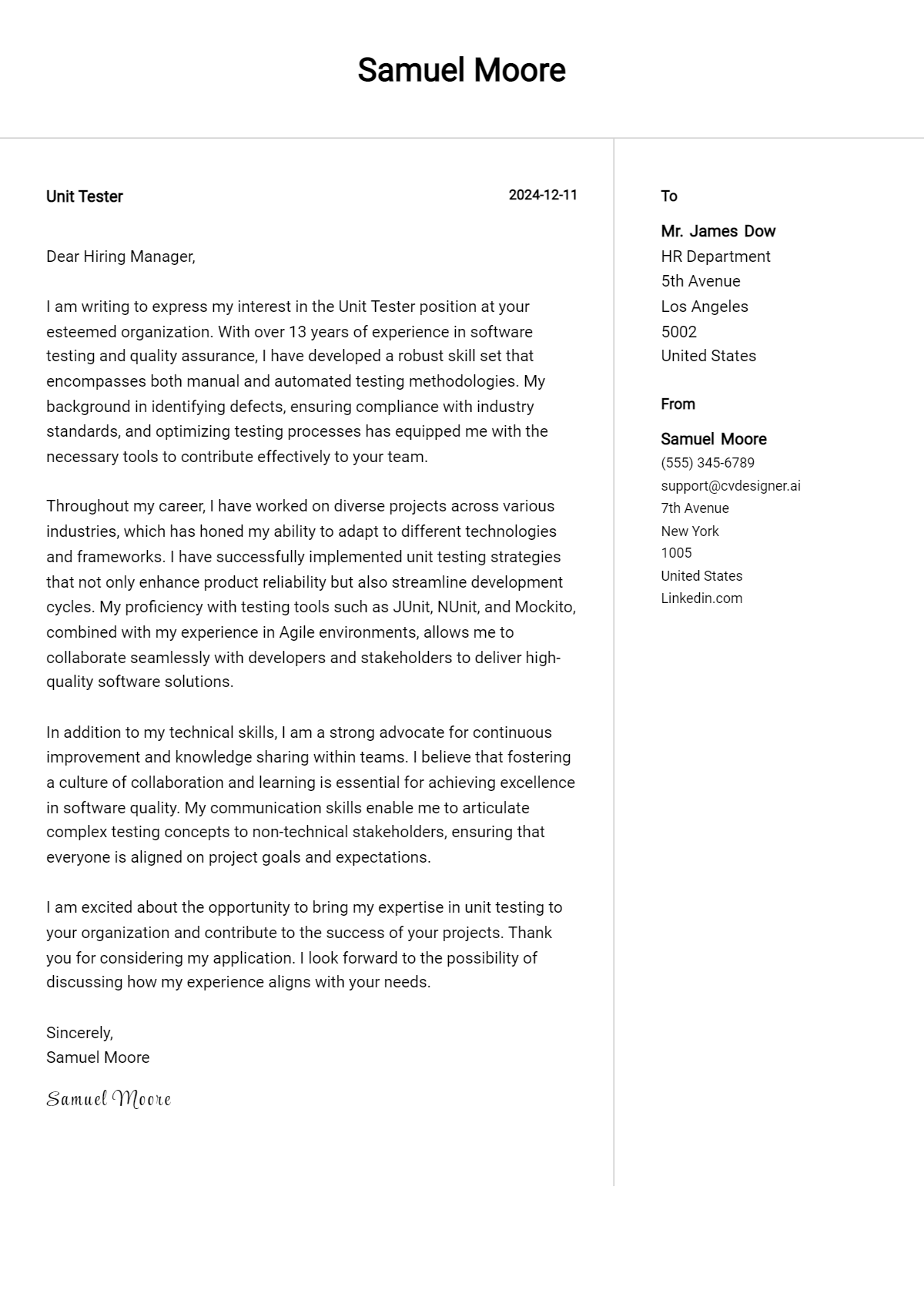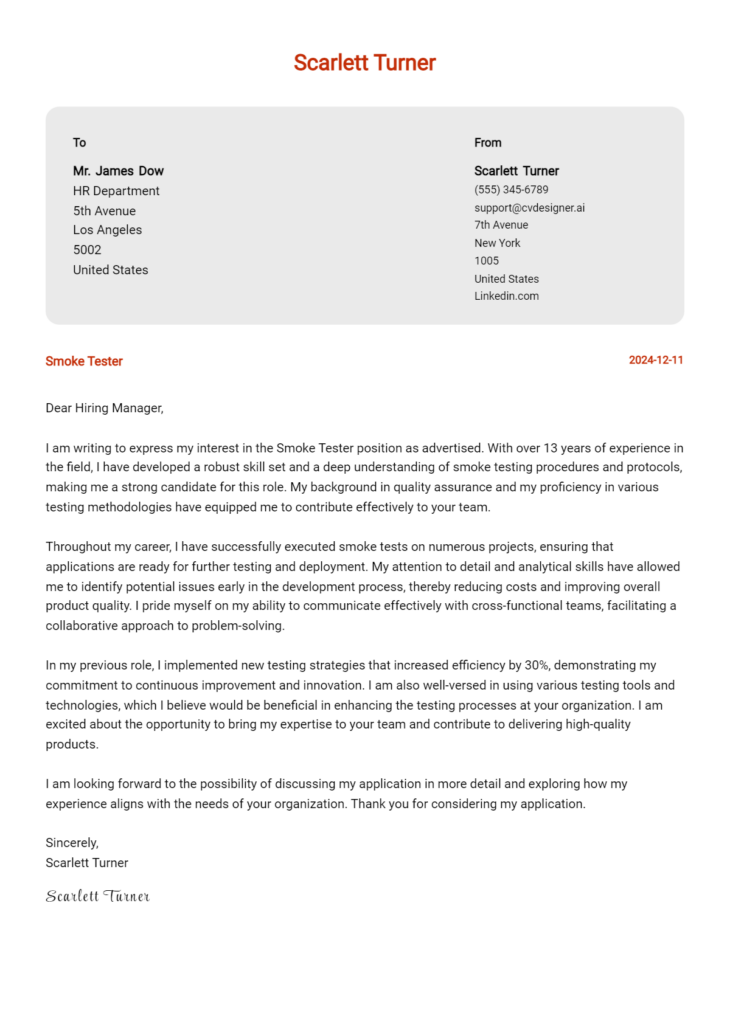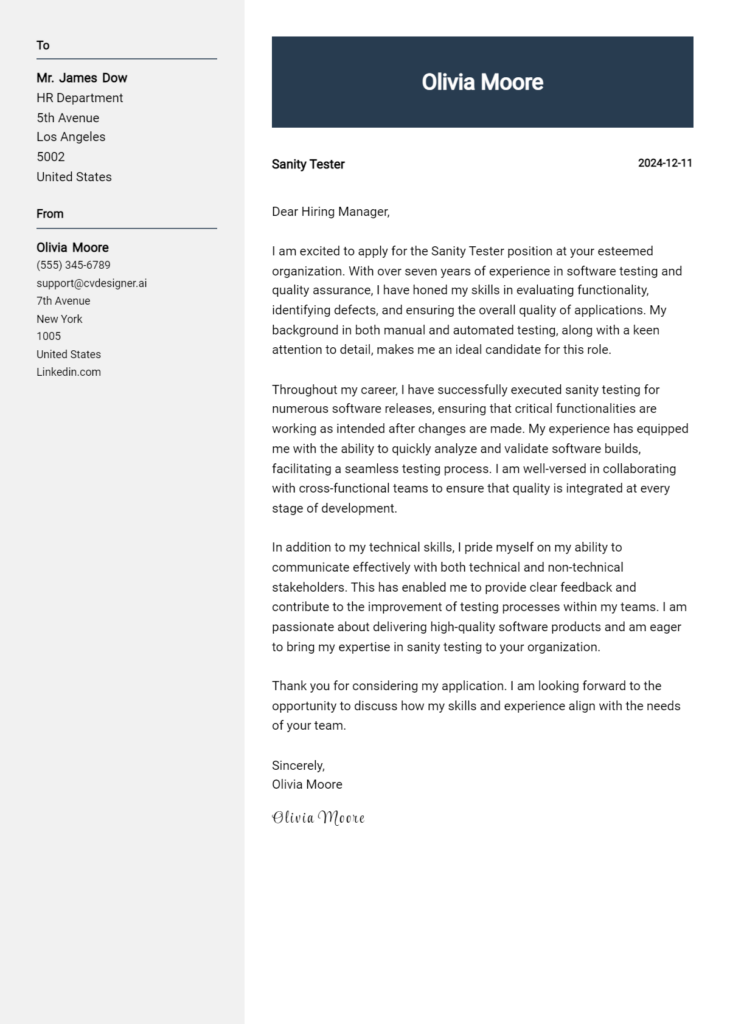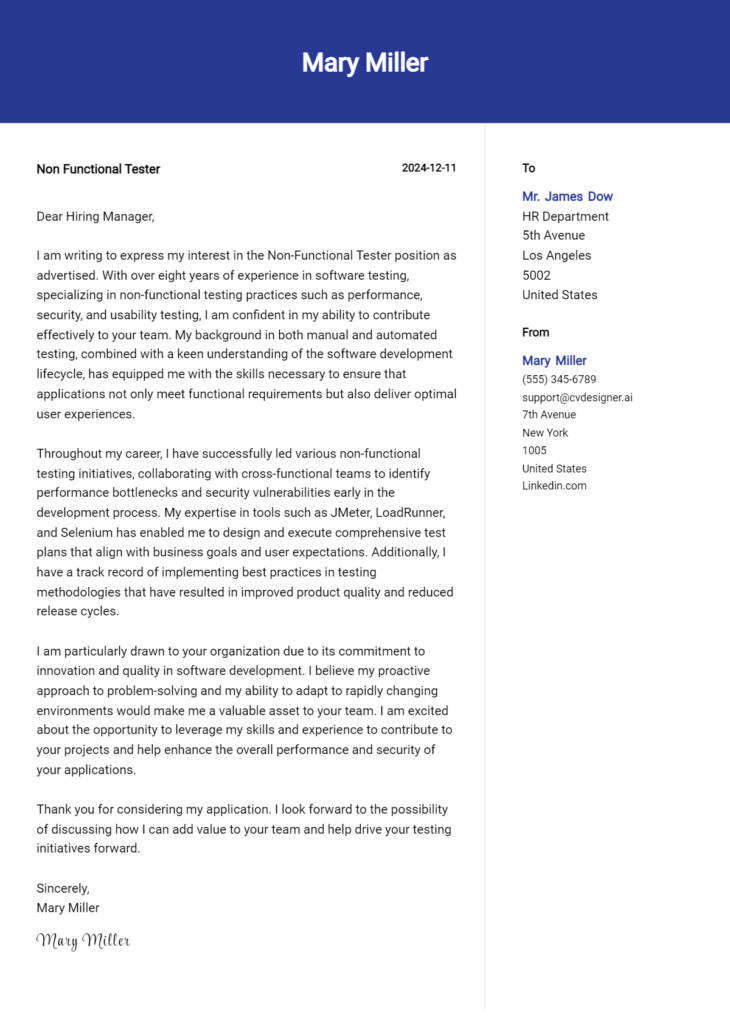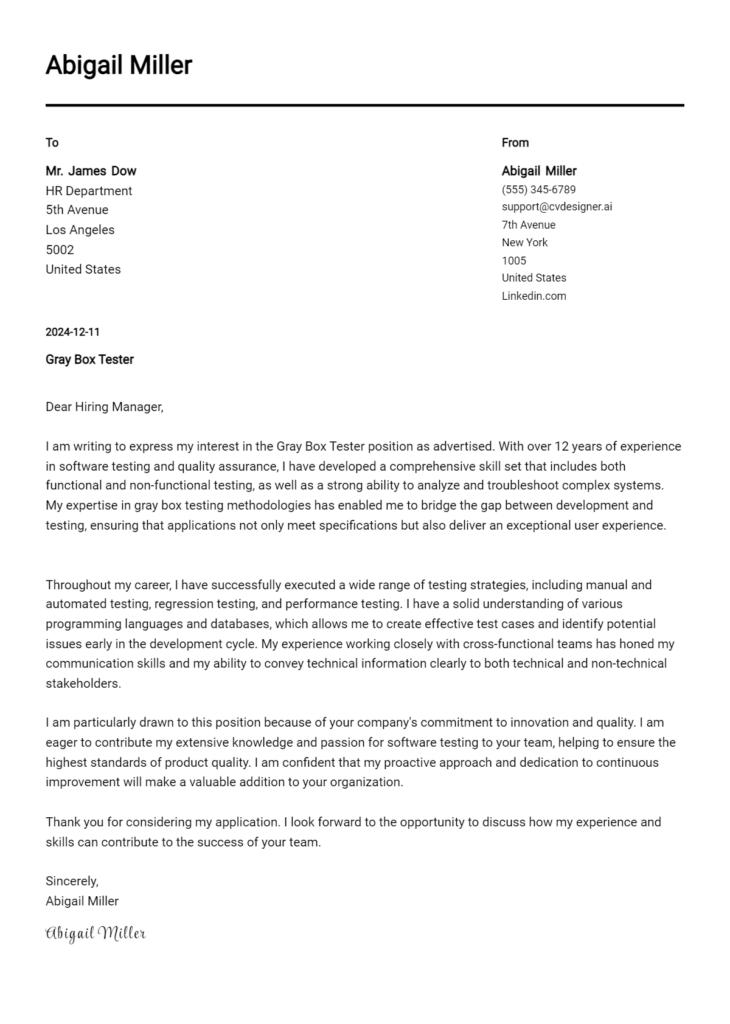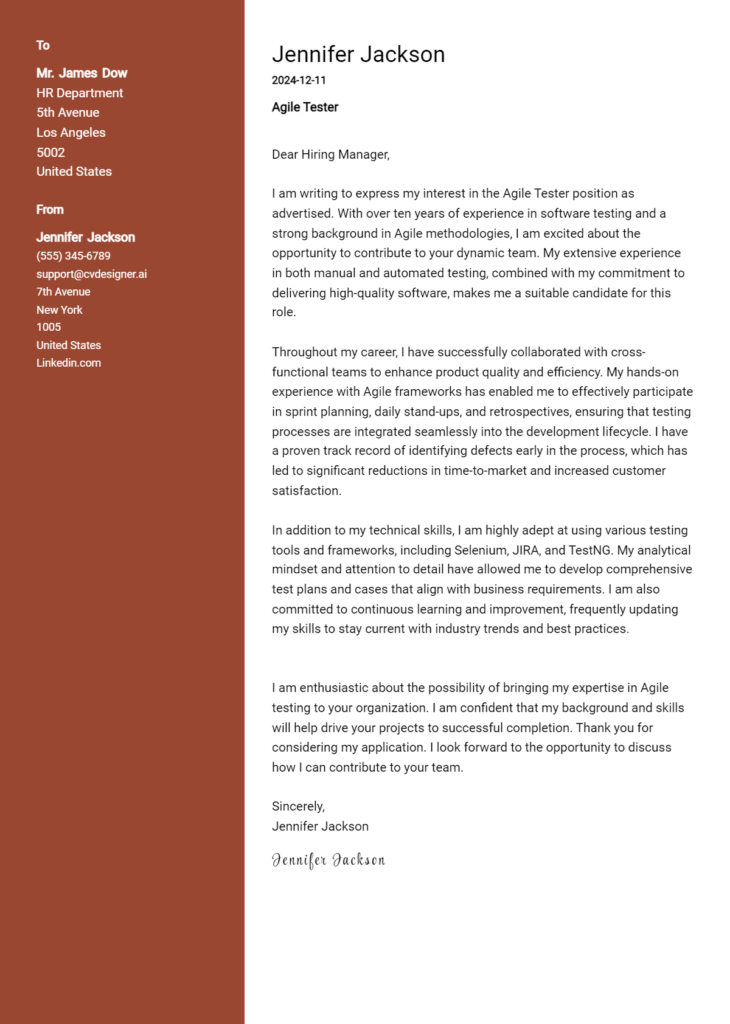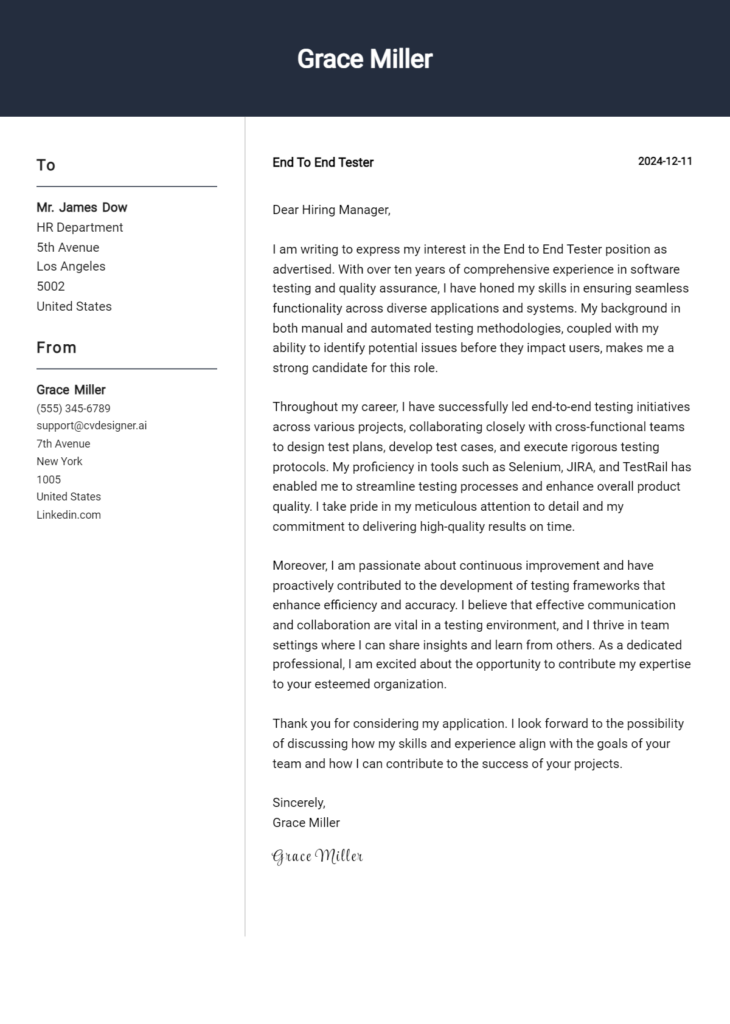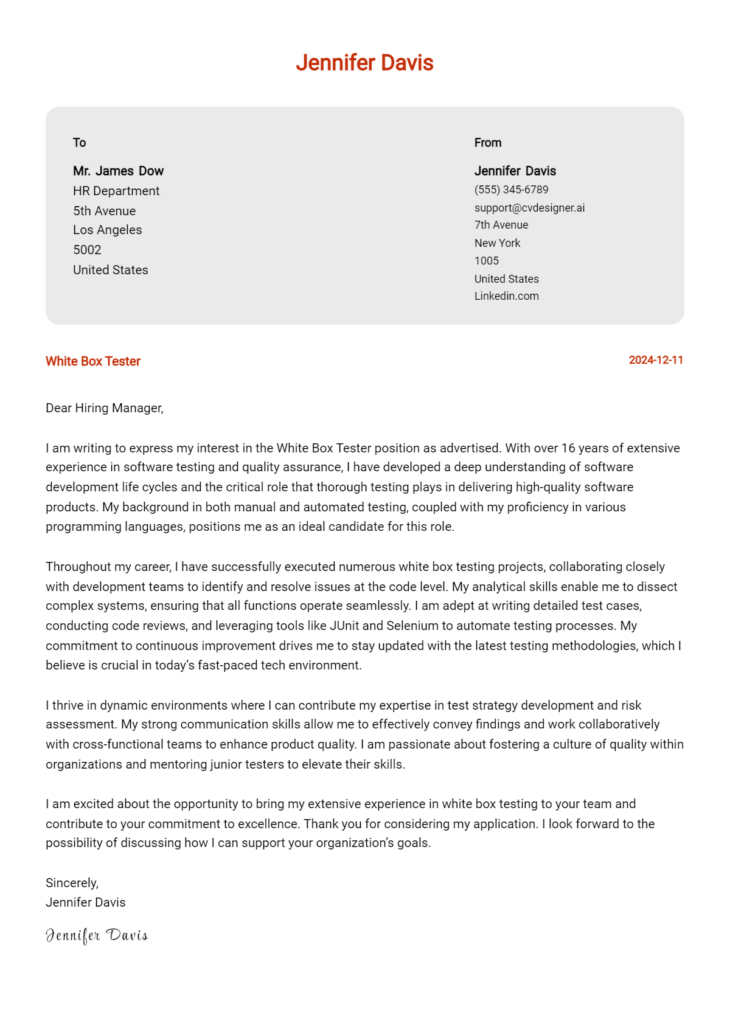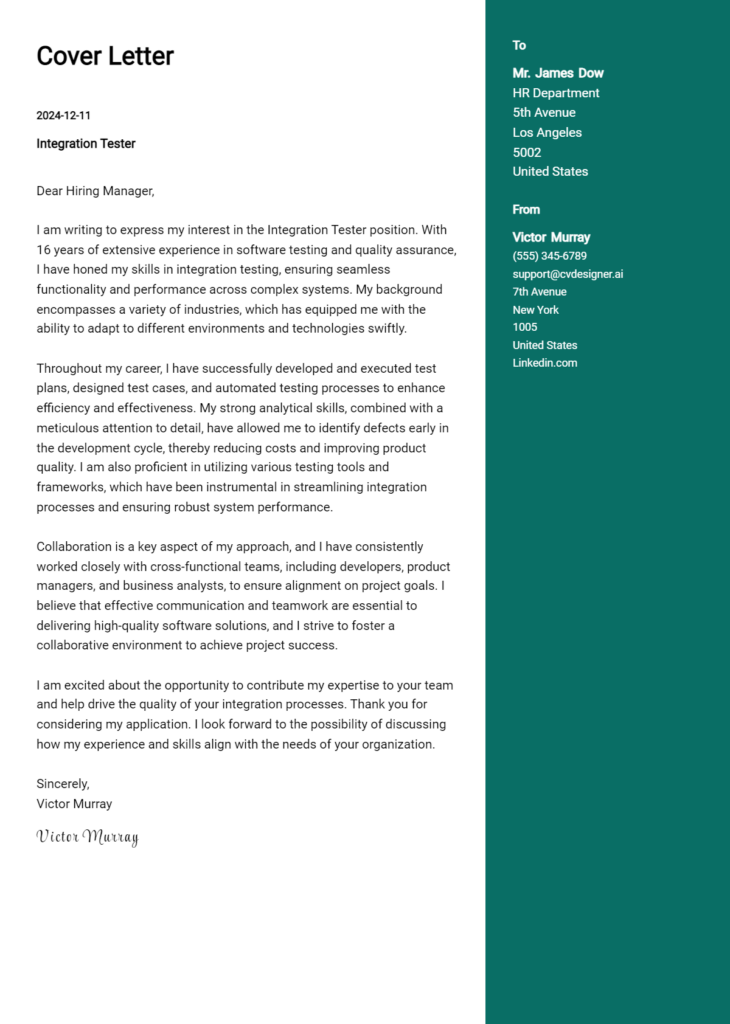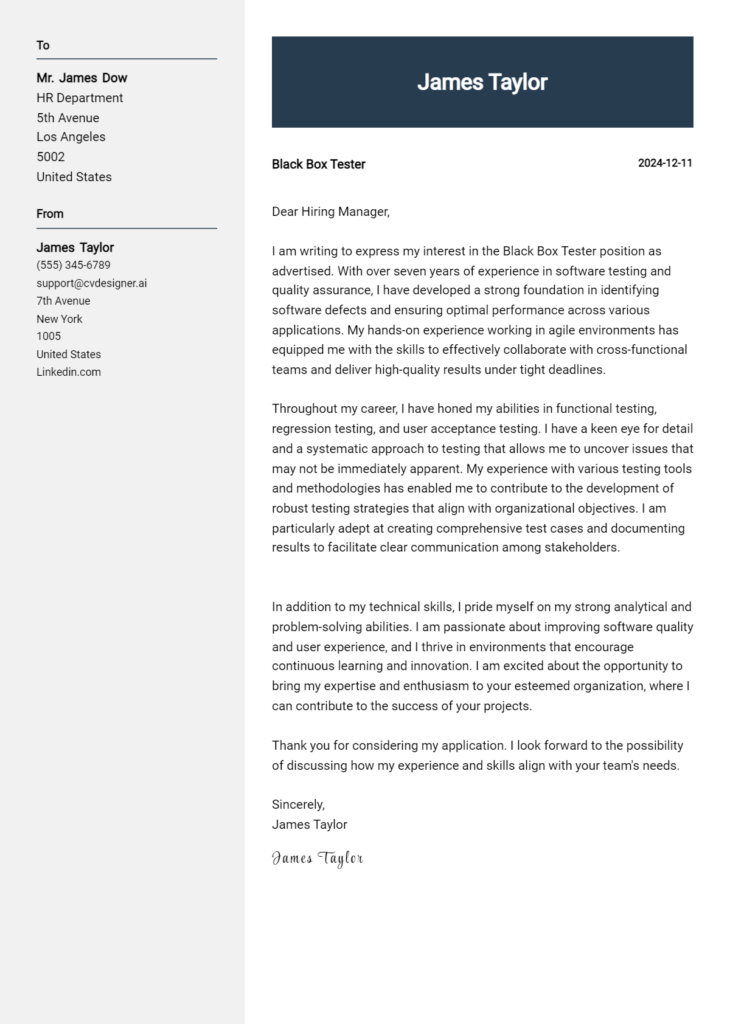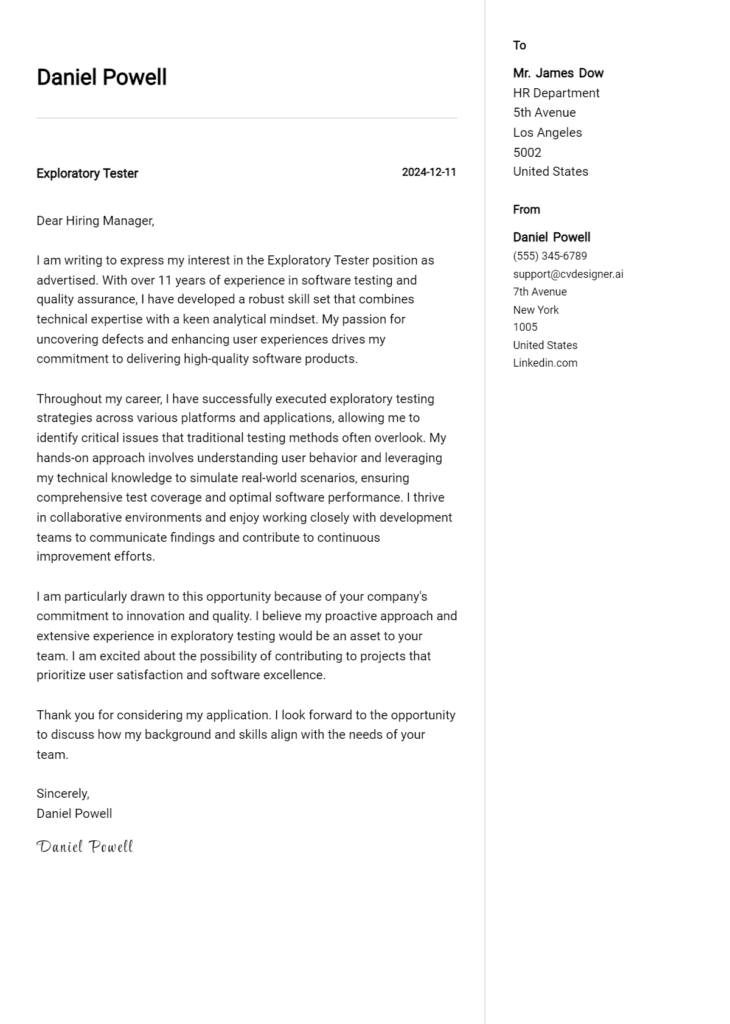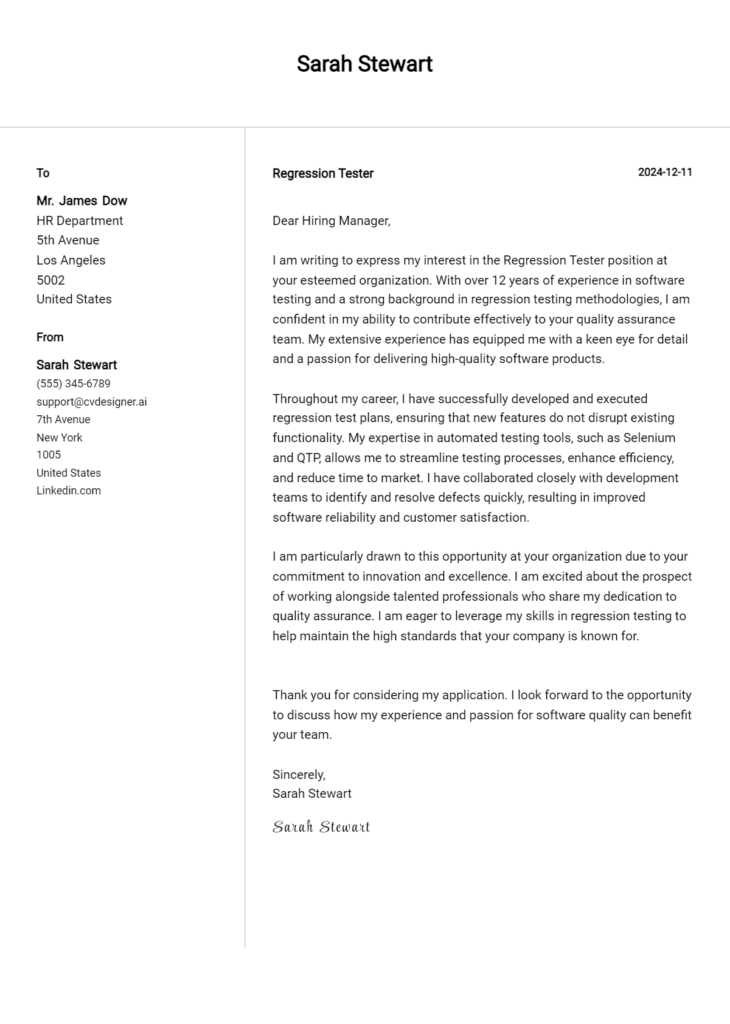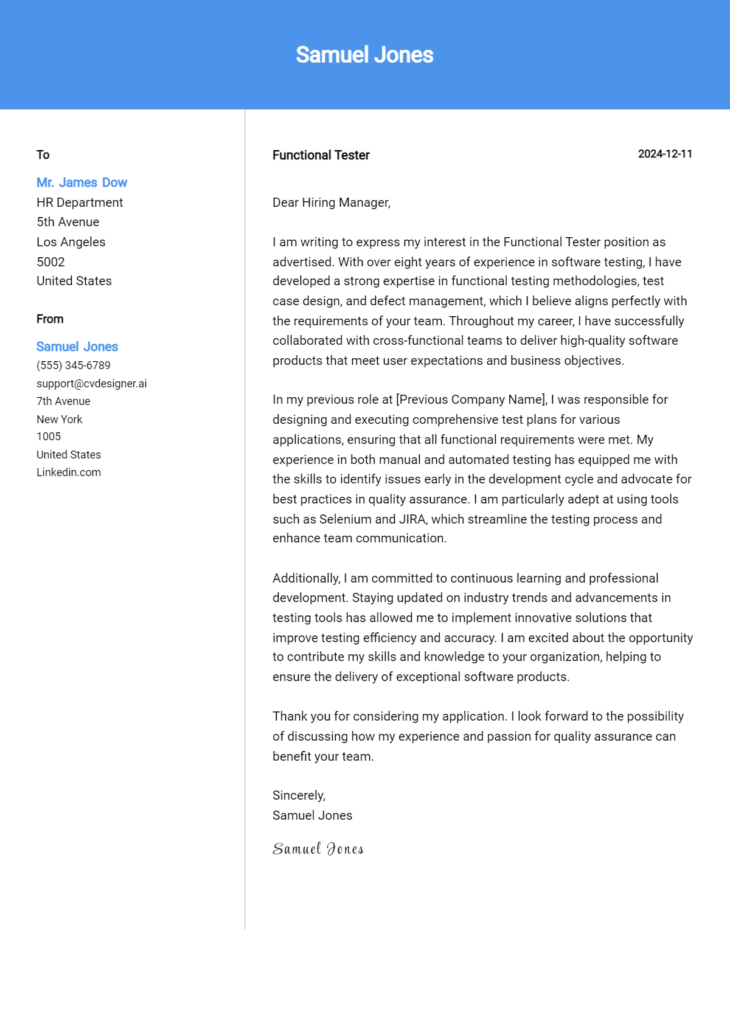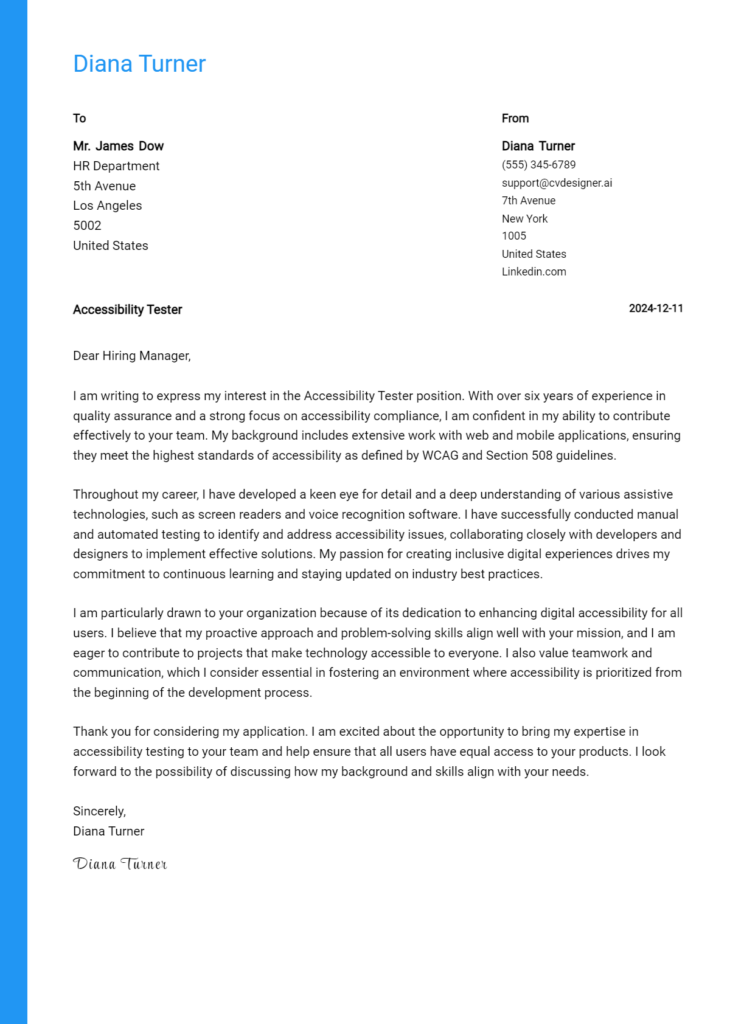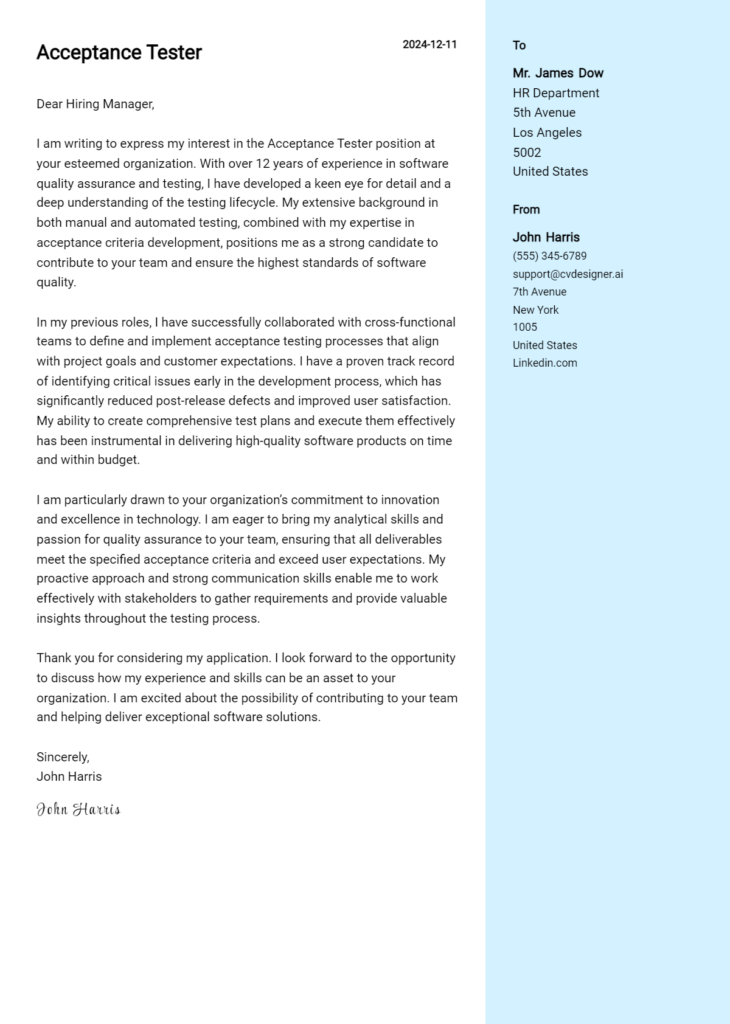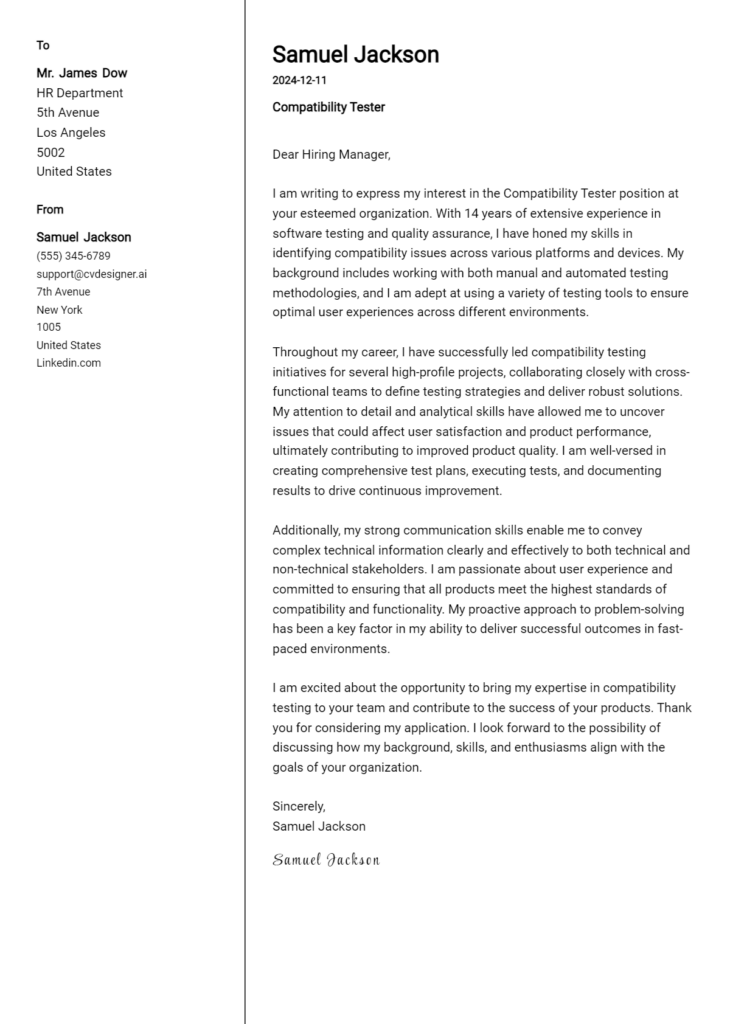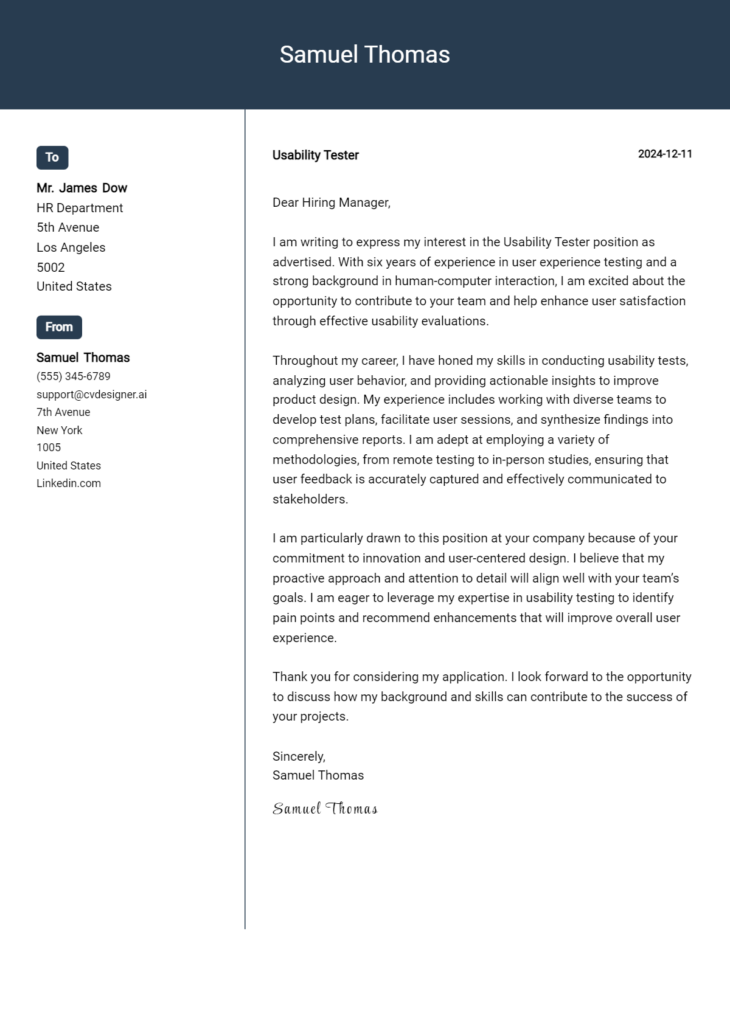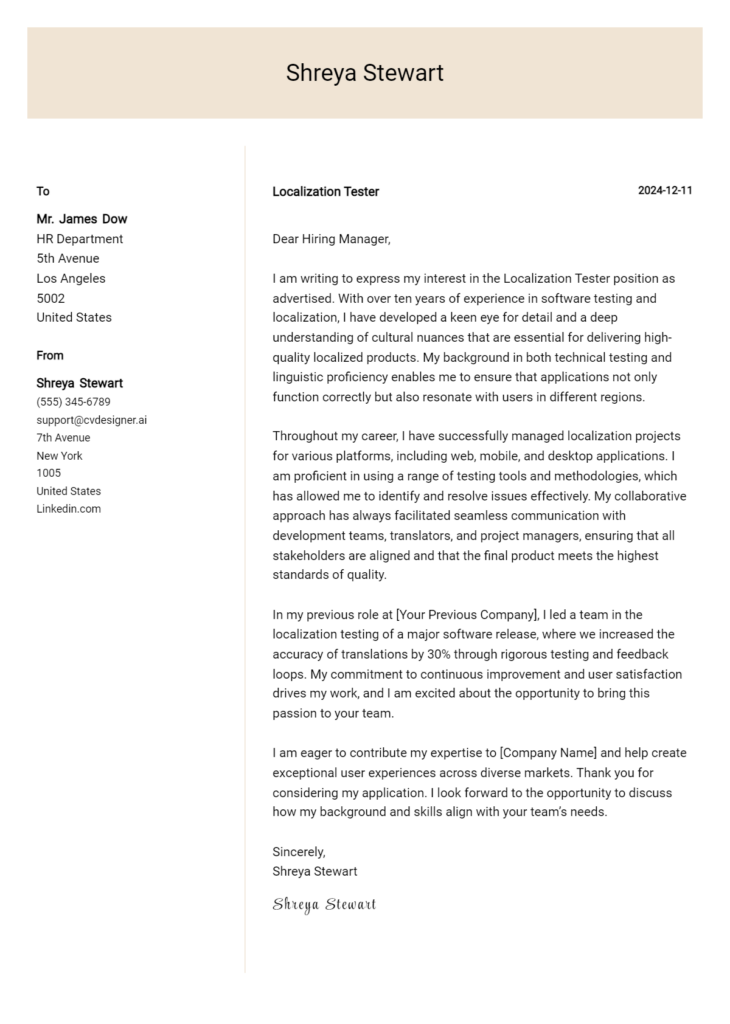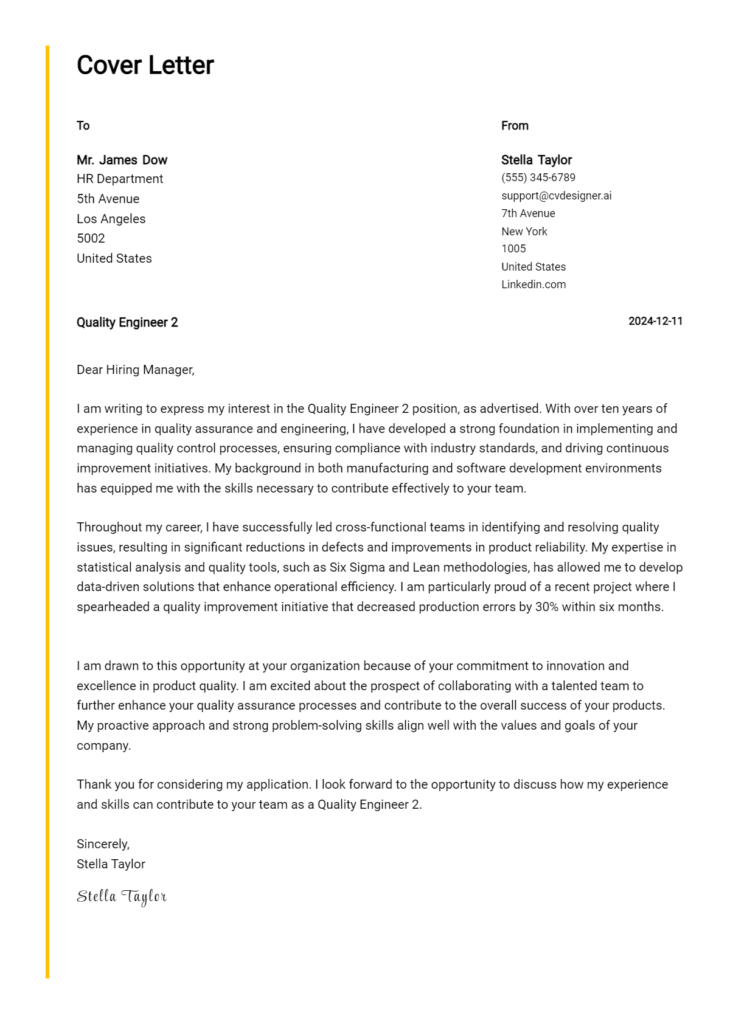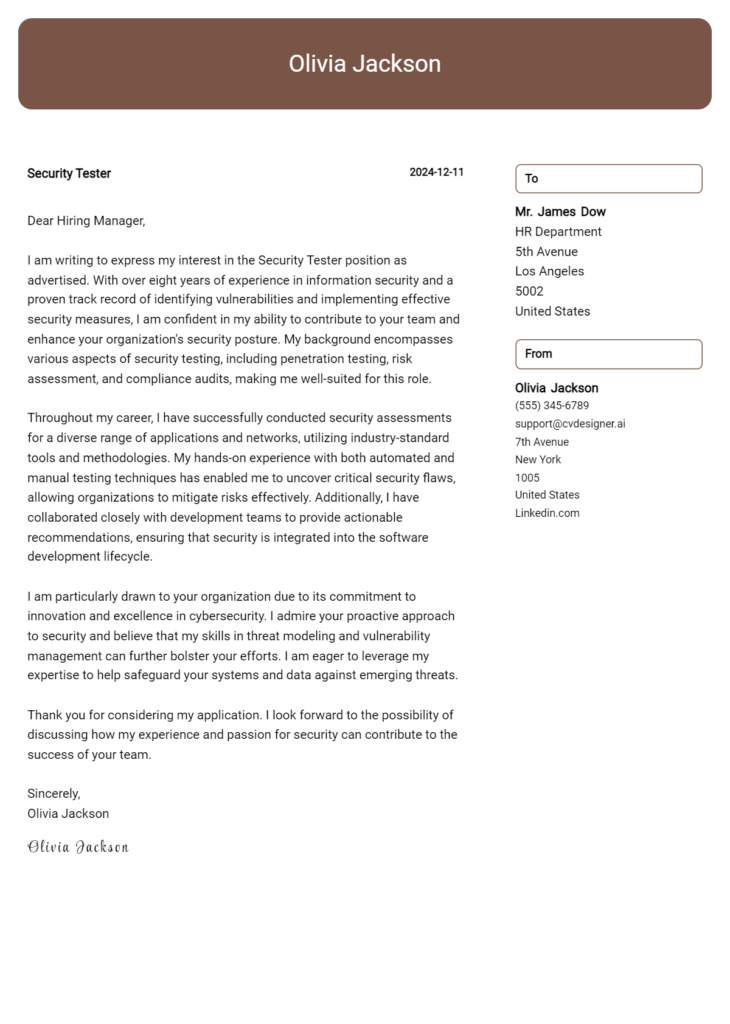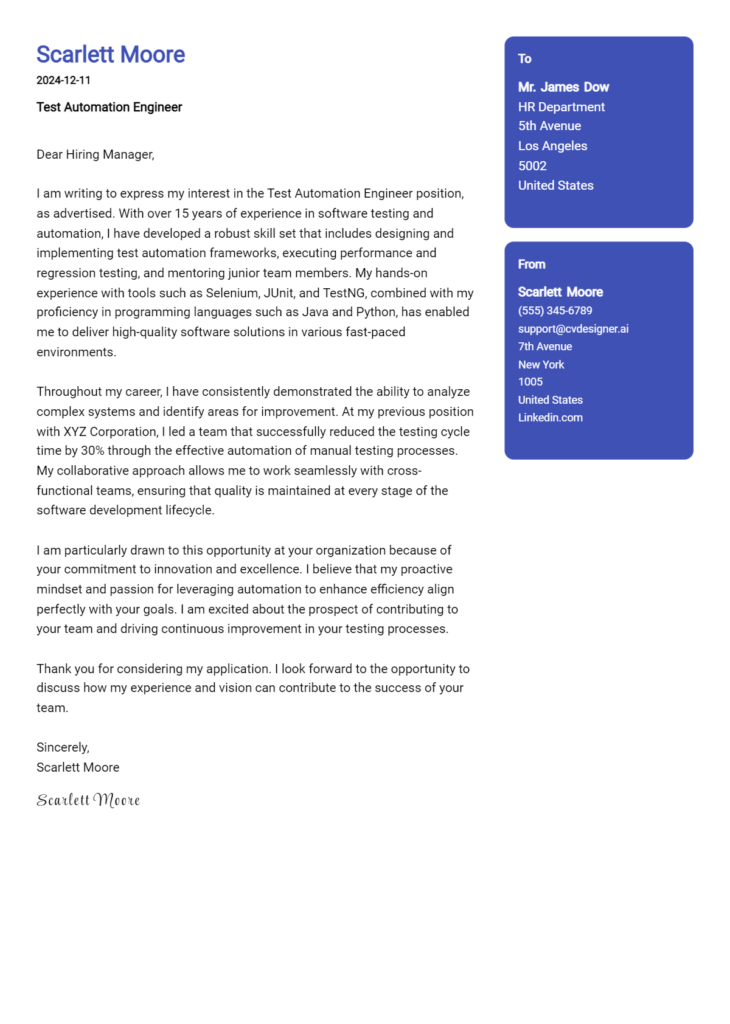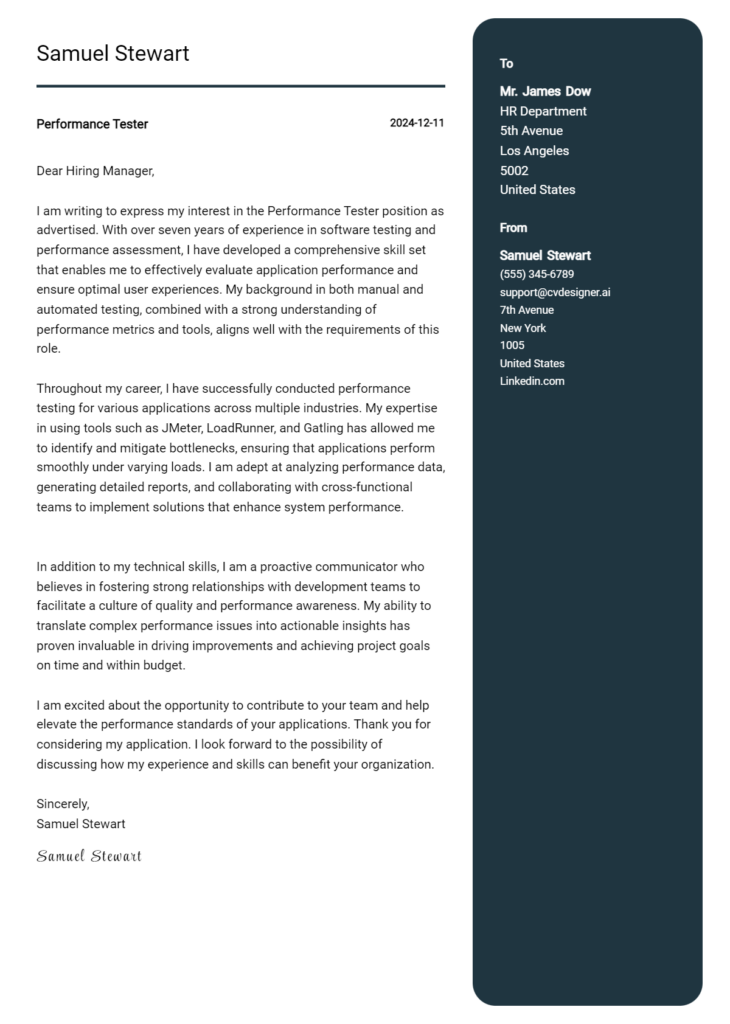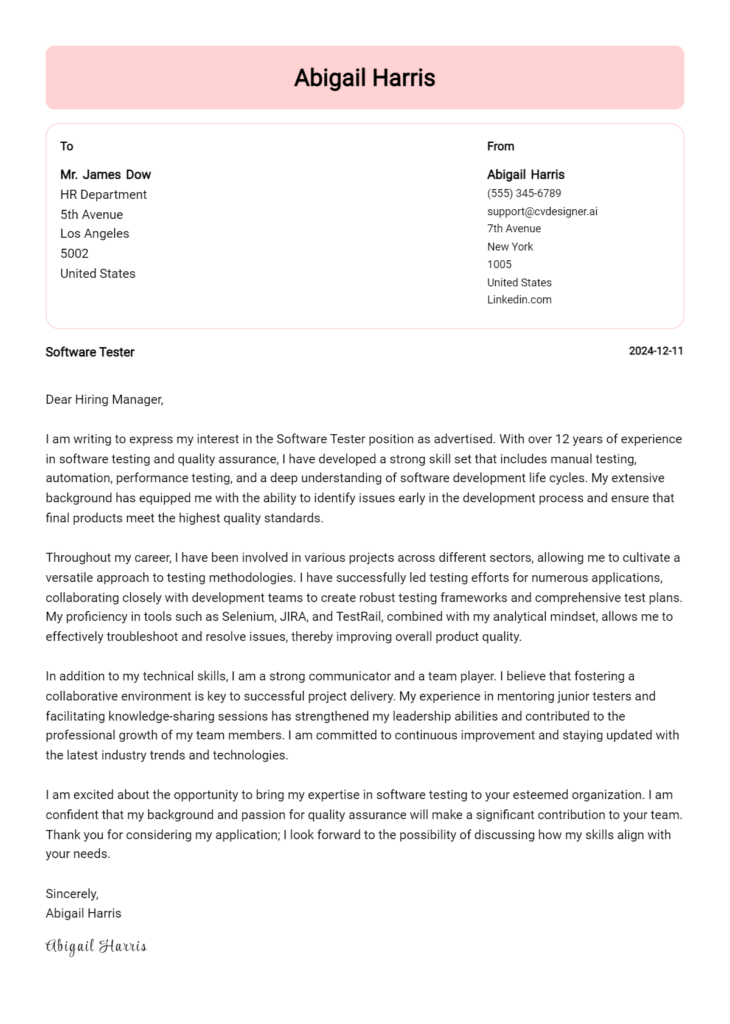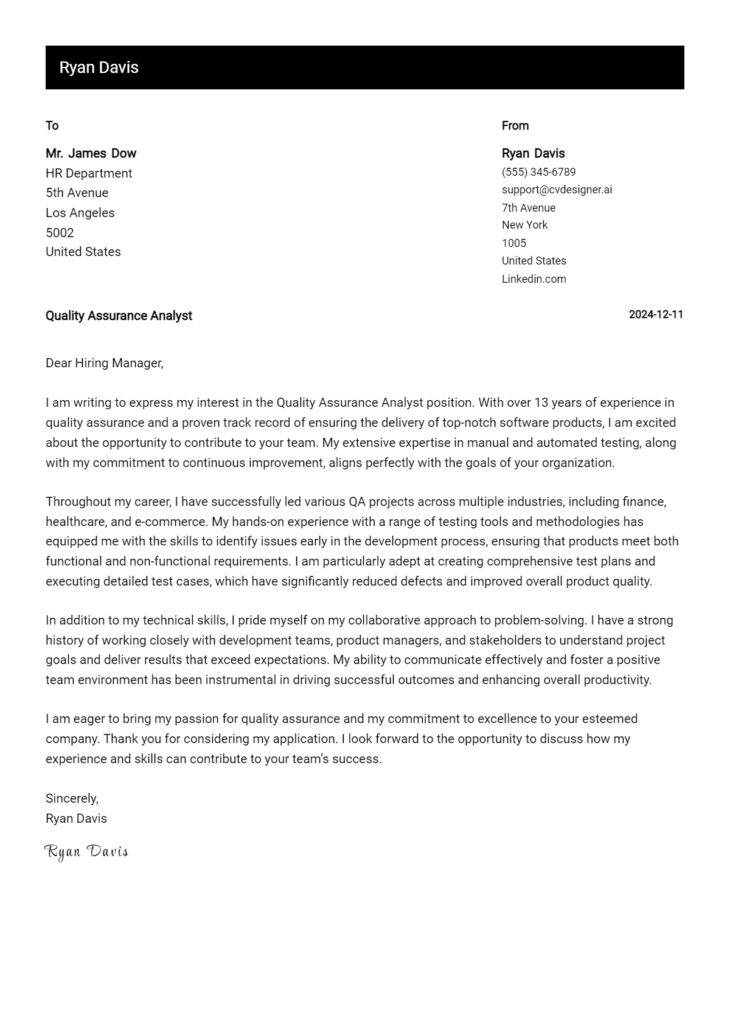Unit Tester Cover Letter Examples
Explore additional Unit Tester cover letter samples and guides and see what works for your level of experience or role.
How to Format a Unit Tester Cover Letter?
Creating a well-structured cover letter is essential for a Unit Tester, as it demonstrates not only your technical skills but also your ability to communicate clearly and effectively. In the world of software testing, attention to detail and precision are paramount, making the presentation of your qualifications just as important as the content itself. A well-formatted cover letter can help capture the hiring manager's interest while showcasing your analytical abilities and commitment to quality assurance.
In this guide, we will outline the necessary components of a professional Unit Tester cover letter, providing insights and examples specific to the role.
We will focus on the essential elements of a cover letter, including:
- Cover Letter Header
- Cover Letter Greeting
- Cover Letter Introduction
- Cover Letter Body
- Cover Letter Closing
Each section is crucial for illustrating your expertise and professionalism as a Unit Tester. Let’s delve into each part and explore how to make your cover letter truly stand out.
Importance of the Cover Letter Header for a Unit Tester
The cover letter header is a critical component of your application as a Unit Tester, as it sets the tone for your professional presentation. A clear and well-organized header provides essential information such as your contact details, the date, and the recipient's information. This not only ensures that your letter is easily identifiable but also demonstrates professionalism and attention to detail—qualities that are vital in the field of software testing. A strong header helps form a positive first impression, while a poorly crafted header can detract from the overall effectiveness of your application.
Strong Example
John Doe 1234 Elm Street Cityville, ST 12345 (123) 456-7890 john.doe@email.com October 10, 2023 Jane Smith Hiring Manager Tech Innovations Inc. 5678 Maple Avenue Cityville, ST 12345
Weak Example
jdoe 123 Elm St 10/10/23 Jane Tech Company
The Importance of a Cover Letter Greeting for a Unit Tester
The cover letter greeting plays a crucial role in establishing the tone for the rest of your letter. A well-crafted greeting demonstrates professionalism and a personal touch, as it shows that you have taken the time to address the hiring manager directly. This initial connection can set the stage for how your qualifications and enthusiasm are perceived. To avoid sounding generic, it's essential to research the recipient's name, which can often be found on the company’s website or LinkedIn profile. A personalized greeting not only reflects your attention to detail but also your genuine interest in the position.
Strong Greeting Example
Dear Ms. Johnson,
Weak Greeting Example
To Whom It May Concern,
The Importance of a Compelling Cover Letter Introduction for a Unit Tester
A well-crafted cover letter introduction is crucial for a Unit Tester as it sets the tone for the entire application and serves as the first impression you make on the hiring manager. This introduction should not only grab attention but also convey genuine interest in the role while highlighting relevant skills or achievements that make the candidate a strong fit. A compelling introduction can distinguish you from other applicants, demonstrating your passion for quality assurance and your understanding of the importance of rigorous testing in software development.
Strong Example
Dear [Hiring Manager's Name], I am excited to apply for the Unit Tester position at [Company Name], where I can leverage my five years of experience in software testing to ensure the highest quality of your applications. With a proven track record of identifying critical bugs and improving testing processes, I am confident in my ability to contribute to your team and enhance the reliability of your software products.
Weak Example
Hello, I am writing to apply for the Unit Tester job. I have some experience in testing software, and I think I could do well in this position. I hope to be a good fit for your company.
Purpose of the Cover Letter Body for a Unit Tester
The body of a cover letter for a Unit Tester serves as a critical opportunity for candidates to articulate their technical skills and relevant experiences while demonstrating their value to potential employers. This section enables candidates to highlight specific projects and accomplishments that showcase their proficiency in designing, executing, and maintaining unit tests, as well as their ability to improve software quality. By detailing their contributions to past projects—such as reducing bug rates, enhancing code coverage, or streamlining testing processes—candidates can effectively convey how their expertise aligns with the needs of the company and how they can contribute to its success.
Strong Example
In my previous role at Tech Innovations, I played a pivotal part in a project aimed at developing a high-performance e-commerce platform. By implementing automated unit tests using JUnit and Mockito, I successfully increased code coverage from 60% to 85%, significantly reducing the number of post-release bugs by 30%. My commitment to quality assurance not only improved the overall user experience but also facilitated a smoother deployment process, resulting in a 20% reduction in release time. I am excited about the opportunity to bring this dedication to quality and efficiency to your team at Digital Solutions.
Weak Example
I have worked as a Unit Tester for several years and have experience with various testing tools. I think I would be a good fit for your company. In my last job, I did some testing and found a few bugs. I am looking forward to the opportunity to work with you.
Importance of the Cover Letter Closing for a Unit Tester
The closing paragraph of a cover letter is crucial for leaving a lasting impression on potential employers, especially for a Unit Tester role. It serves as a final opportunity to summarize qualifications, reiterate enthusiasm for the position, and encourage the hiring manager to take the next steps, such as reviewing the resume or scheduling an interview. A strong closing reinforces the candidate's fit for the role and expresses eagerness to discuss contributions in more detail, while a weak closing might leave the reader unsure about the candidate's interest or qualifications.
Strong Example
Thank you for considering my application for the Unit Tester position at [Company Name]. With my extensive experience in software testing, attention to detail, and commitment to delivering high-quality results, I am excited about the opportunity to contribute to your team. I look forward to the possibility of discussing my qualifications further and how I can help [Company Name] achieve its goals. Please feel free to review my resume, and I would be thrilled to schedule an interview at your convenience.
Weak Example
I hope you like my application. I think I can be a good Unit Tester, but I’m not sure. Please look at my resume when you have time. It would be nice to talk if you want to.
These tips are designed to assist candidates in crafting an effective cover letter for a Unit Tester position. A well-written cover letter can significantly enhance your application by clearly demonstrating your technical skills, problem-solving abilities, knowledge of the Software Development Life Cycle (SDLC), teamwork experience, and a commitment to continuous learning. By focusing on these areas, you'll be able to present yourself as a strong candidate who is not only capable of performing the job but also eager to grow in the field.
Tips for Writing an Effective Cover Letter for a Unit Tester
Highlight Your Technical Skills: Begin by showcasing your technical expertise relevant to unit testing. Mention specific programming languages, testing tools, and frameworks you are proficient in, such as JUnit, NUnit, Selenium, or TestNG. Providing examples of how you've used these skills in previous projects can illustrate your competence effectively.
Demonstrate Problem-Solving Abilities: Unit testing often involves identifying and resolving issues in code. Use your cover letter to describe a situation where you encountered a challenging problem during testing and how you successfully addressed it. This not only highlights your analytical skills but also your ability to think critically under pressure.
Showcase Your Knowledge of the SDLC: Understanding the Software Development Life Cycle is crucial for a Unit Tester. Mention your familiarity with various stages of the SDLC and how unit testing fits into the larger development process. This insight can help potential employers see you as a well-rounded candidate who understands the importance of quality assurance in software development.
Emphasize Teamwork and Collaboration: Unit testers often work closely with developers and other team members. Include examples of how you have collaborated with others in past roles to enhance the quality of software. Discussing your ability to communicate effectively and contribute to team success can set you apart from other candidates.
Express a Passion for Continuous Learning: The tech industry is always evolving, and a commitment to continuous learning is essential for staying relevant. Mention any certifications, courses, or self-study initiatives you have taken to improve your testing skills and knowledge. This demonstrates your dedication to professional growth and adaptability in a rapidly changing environment.
For more resources, consider exploring cover letter templates or using a cover letter builder to create a polished and tailored document that reflects your unique qualifications and enthusiasm for the Unit Tester role.
Common Mistakes to Avoid in a Unit Tester Cover Letter
Avoiding common mistakes in a cover letter is crucial for success, especially in a competitive field like unit testing. A well-crafted cover letter can effectively showcase your skills and help you stand out to hiring managers. Here are some common pitfalls to watch out for:
- Generic Content: Many candidates use a one-size-fits-all approach. Tailor your letter to the specific job by including relevant skills and experiences related to unit testing.
- Overly Technical Language: While it's important to demonstrate your technical expertise, avoid jargon that may not be understood by all readers. Aim for clarity and conciseness.
- Neglecting the Format: A poorly formatted cover letter can detract from your message. Follow a professional cover letter format to ensure your letter is easy to read and visually appealing.
- Lack of Specific Examples: Failing to provide concrete examples of your achievements can weaken your case. Highlight specific projects or successes that showcase your unit testing skills.
- Ignoring the Employer's Needs: Make sure to address how your skills align with the company's goals. Research the company and mention how you can contribute to their success.
- Typos and Grammatical Errors: Spelling and grammar mistakes can create a negative impression. Always proofread your letter or ask someone else to review it before submission.
- Missing a Call to Action: Closing your letter without a clear call to action can leave the reader unsure about the next steps. Invite them to contact you for an interview to discuss your qualifications further.
For more guidance, check out cover letter examples that can inspire your approach. By avoiding these common mistakes, you can create a compelling cover letter that effectively presents your qualifications for the unit tester role.
Cover Letter FAQs for Unit Tester
What should I include in my cover letter for a Unit Tester position?
In your cover letter for a Unit Tester position, you should include several key elements: a strong opening that captures attention, a brief overview of your relevant experience, specific skills related to unit testing, and examples of how you have successfully contributed to past projects. Highlight your familiarity with testing frameworks and tools, such as JUnit or NUnit, and your understanding of software development life cycles. Additionally, mention your problem-solving abilities and your attention to detail, which are crucial for identifying and resolving bugs. Finally, conclude with a call to action, expressing your enthusiasm for the role and your desire for an interview.
How can I tailor my cover letter for a specific Unit Tester job?
To tailor your cover letter for a specific Unit Tester job, start by closely reading the job description and identifying key skills and requirements. Use this information to align your experiences with what the employer seeks. For instance, if the job emphasizes experience with a particular programming language or testing framework, make sure to highlight your proficiency in that area. Additionally, mention any relevant projects where you applied unit testing techniques effectively. Including specific metrics or outcomes, such as improved code coverage or reduced bug rates, can further demonstrate your impact. Personalizing your cover letter shows that you are genuinely interested in the position and understand the company’s needs.
How do I demonstrate my technical skills in a cover letter?
To effectively demonstrate your technical skills in a cover letter for a Unit Tester position, use concrete examples from your previous work. Instead of simply stating that you are familiar with unit testing, detail a project where you implemented unit tests and the specific tools you used, such as Jest or Mocha. Explain the challenges you faced during testing and how you overcame them to improve software quality. Additionally, you can mention any certifications or relevant coursework that bolster your technical qualifications. By providing evidence of your skills through real-world applications, you make a compelling case for your ability to contribute to the team.
Should I mention my soft skills in a Unit Tester cover letter?
Yes, mentioning your soft skills in a Unit Tester cover letter is essential. While technical abilities are crucial for the role, soft skills such as communication, teamwork, and problem-solving are equally important in a collaborative environment. Unit testers often work closely with developers, product managers, and other stakeholders, so showcasing your ability to communicate effectively and work well in a team can set you apart. Provide examples of how you’ve successfully collaborated on projects or resolved conflicts within teams. Highlighting your adaptability and willingness to learn can also demonstrate that you’re a well-rounded candidate who can thrive in dynamic work settings.
Build your Cover Letter in minutes
Use an AI-powered cover letter builder and have your letter done in 5 minutes. Just select your template and our software will guide you through the process.

